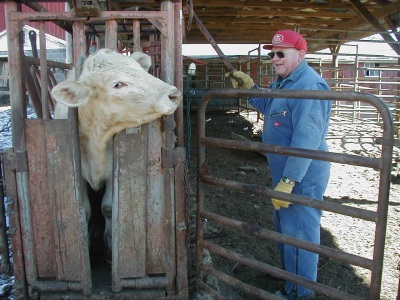
Bob Tibbs of Shadow Springs Farm in Havre de Grace demonstrates how he uses the "squeeze chute" to tag and inoculate his cattle.
By HALLIE C. FALQUET, Capital News Service
HAVRE DE GRACE - The calf barely flinched as Bob Tibbs clipped a bright, yellow tag through the newborn's ear.
The beef cattle farmer and National Charolais Association president has tagged and tracked his animals for 30 years using his own system as well as the association's, but that may soon change as the United States Department of Agriculture attempts to bring all farmers in line with the National Animal Identification System.
"It's critical to create the map so if there is some sort of disease outbreak, we can locate the animals in an area," said Marilyn Bassford, coordinator for the NAIS for the state of Maryland.
While she said that "the registering of premises is vital," the NAIS will remain voluntary.
The program has two steps: first, to register the premises (any plot where agricultural animals are raised, held or boarded), and second, to register all individual animals who leave the premises.
The registration numbers are then entered into a database to create a national tracking system of all agricultural animals, including livestock, swine, poultry and horses.
In the event of a disease outbreak such as the equine herpes virus in Laurel last year, the infected animal could be traced to its origin much faster than today.
"I think that from the standpoint of maintaining the integrity of the food supply it's important to know where all the livestock are being produced," said NAIS registered beef cattle farmer Scott Barao, executive director of the Maryland Cattlemen's Association.
Maryland is concentrating on premise registration only and has 1,300, or 16 percent, of premises registered, ranking the state 23rd nationally.
There is no timeline in place to begin the implementation of individual animal registration.
Although once a premise is registered, Bassford said, animals can be tagged through NAIS if desired, but she recommends holding off until that part of the program is completely set to go.
Tibbs has not registered his farm for just that very reason. Even though the cost of registering the premise is free, he doesn't want to have any part of it until he's sure the system won't change.
"You have to spend all the money on this thing and what happens if five years from now they say we're going to tag in the left ear and not the right ear," he said. "Then I have to go back through and redo it all."
Sue DuPont, the spokeswoman for the Maryland Department of Agriculture recognizes that the initial changes in the program led to the uncertainty of farmers like Tibbs, but, she said, the changes have all been made and the position of the federal government is now "pretty solid."
The cost factor comes in once the farmer moves to the step of registering individual animals. At that point, it depends on the type of industry the farmer is in as to what the total investment will be.
In addition to the cost of a tag, which can go from $2 for cattle up to $15 for horses, there is also the cost of the scanning equipment and the time spent inserting and scanning all the tags.
While cows and horses can be tagged individually, a dispute over the tagging of poultry has ruffled the feathers of farmers like David Smith of Springfield Farms in Sparks.
"I think it's absolutely ridiculous," Smith said. "If I had a thousand chickens and I had to have a chip in each and every one of them...it would require me to invest tens of thousands of dollars in equipment. That's not right for a small farm."
In a year, Smith has approximately 7,000 chickens and 1,000 turkeys. Maryland poultry and related products ranked 16th among states in a 2005 report from the United States Department of Agriculture, for a total of $58.1 billion.
The livestock and poultry industries are not the only agricultural operations hesitant to join the NAIS.
Cheryl Edelen of At Last Farm LLC in Aquasco has not registered her horse facility yet, but does have a similar tracking device in her year-old Labrador retriever, Pearl.
She does not use a radio frequency chip in her horses, either saying more testing needs to be done on smaller animals like Pearl, before moving to the bigger ones.
Perhaps an even greater hurdle for advocates is the refusal to give up private information.
"Just simply on the surface it may look to people like another government intrusion in their business, DuPont said, "but once you dig past the surface, the true purpose is protecting animal health and protecting business."
All private business and individual information required for the registration is protected from dissemination under federal law, said Ben Kaczmarski, spokesman for the Animal and Plant Health Inspection Service based in Riverdale.
Beef cattle farmer Ned Sayre didn't have a problem registering his farm with the NAIS because the information needed was identical to information he provided to a farm bill and cost share program. But he does have some colleagues in the feed lot business who are averse to the program for fear of giving up their privacy.
It's important for them to maintain "the security of that information in the event there was an outbreak and it went into the public record," Sayre said.
Bassford knows she faces a tough crowd as she strives to register all of Maryland's agricultural premises, but said the benefits of the program will overcome the opposition.
"When asked how to eat an elephant," she says, "well, one bite at a time."


